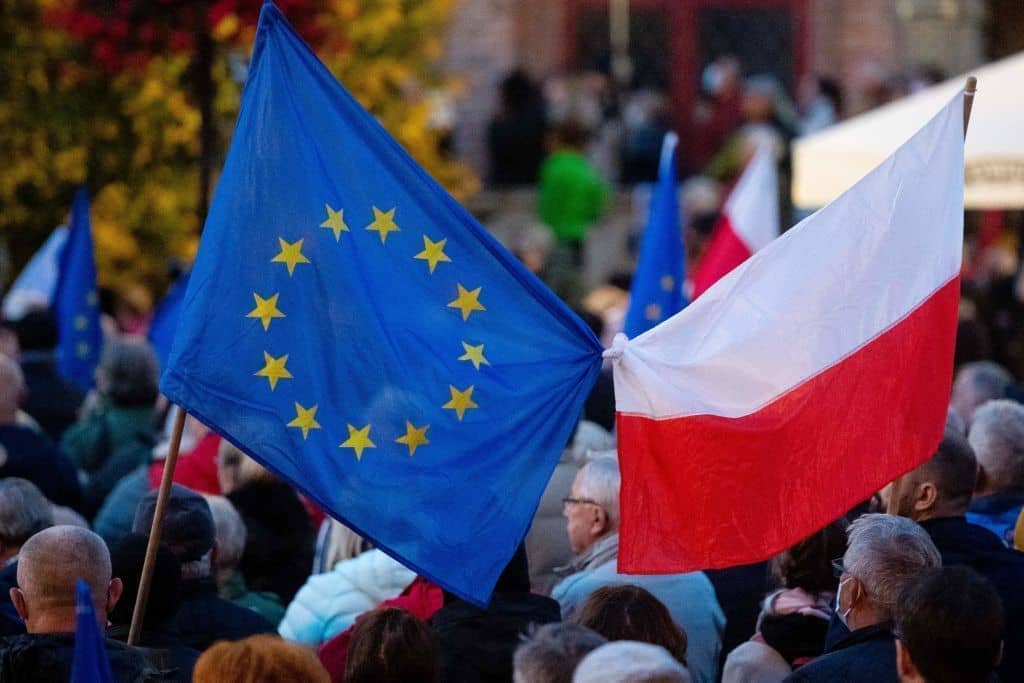In recent months the spectre of ‘Polexit’ has been haunting Europe. Poland and the EU have become embroiled in a dispute over the rule of law and this week the European court announced that it would be fining Poland one million euros every day until it abolished its controversial disciplinary chamber for judges, leading some to speculate that Poland could be heading towards leaving the European Union. But is Polexit really a risk? Possibly not. But one thing is clear: the crisis between Warsaw and Brussels will not build up for much longer without either a compromise or drastic consequences.
Before considering the possibility of Polexit, it must first be remembered that the vast majority of Poles are clearly in favour of remaining in the EU and the country, as one of the main recipients of EU funds, is in dire need of Covid subsidies. Polexit is not a realistic option for the Polish government despite its current opposition to Brussels.
For the EU, Polexit is a threat designed to put pressure on both the Polish government and its people
But Brussels has an incentive to keep Poland happy too: after the disaster of Brexit, a Polexit would plunge the EU into a fatal existential crisis, especially since Poland’s exit could well be followed by that of Hungary and other states. This would shatter the narrative of the ‘ever closer union’ and deeply damage Brussels’s credibility. Polexit would hit the EU economically too, since a large part of EU aid for Poland flows back to the west, especially Germany which benefits from large Polish contracts. Poland and its fabulous growth rates are also an investment destination for western markets, especially in times of economic depression.
Why, then, if both sides stand to lose from Polexit, is it currently being debated? The reason is simple: for the EU, Polexit is a threat designed to put pressure on both the Polish government and its people, and to force them onto Brussels’s current ideological course. While from a Polish perspective, Polexit is being used to show that the country doesn’t have to submit to the EU’s will.
Brussels and Warsaw are currently playing a high-stakes poker game to see who can hold their nerve. But if neither player wants to give in, the stakes could easily become too high, leading to extreme consequences that are undesirable for both parties.
There are three ways that the rule of law crisis could be solved outside of Polexit. Brussels undoubtedly hopes that the Law and Justice party will lose its majority at the next election, to be replaced by Brussels’s preferred left-liberal candidate, Donald Tusk. Poland might have a different best-case scenario in mind: a European economic crisis, or a possible conservative change of government in Italy or France, could massively divert European institutions from their current course.
An intermediate solution would be a cautious and realistic compromise: Poland could accelerate its legal reforms to signal to the outside world that it takes the rule of law seriously, while Brussels, in view of the increasing criticism of the ECJ by member states, could overhaul the court as part of the upcoming ‘Conference on the Future of Europe’. This seems to be the most realistic scenario for all parties and would diffuse this showdown.
But are politic compromises still realistic in an age of identity politics and absolute, albeit diffuse, ‘values’? It can by no means be ruled out that increasingly radicalised left-liberal hardliners in the European Parliament, as well as outraged patriots in Poland, egged on by their respective media, will cause this poker game to continue. Brexit was also not seriously intended by Brussels, nor by London – and has nevertheless become a political reality. Both sides will have to tread carefully if they don’t want Poland to follow Britain out of the European Union.






Comments